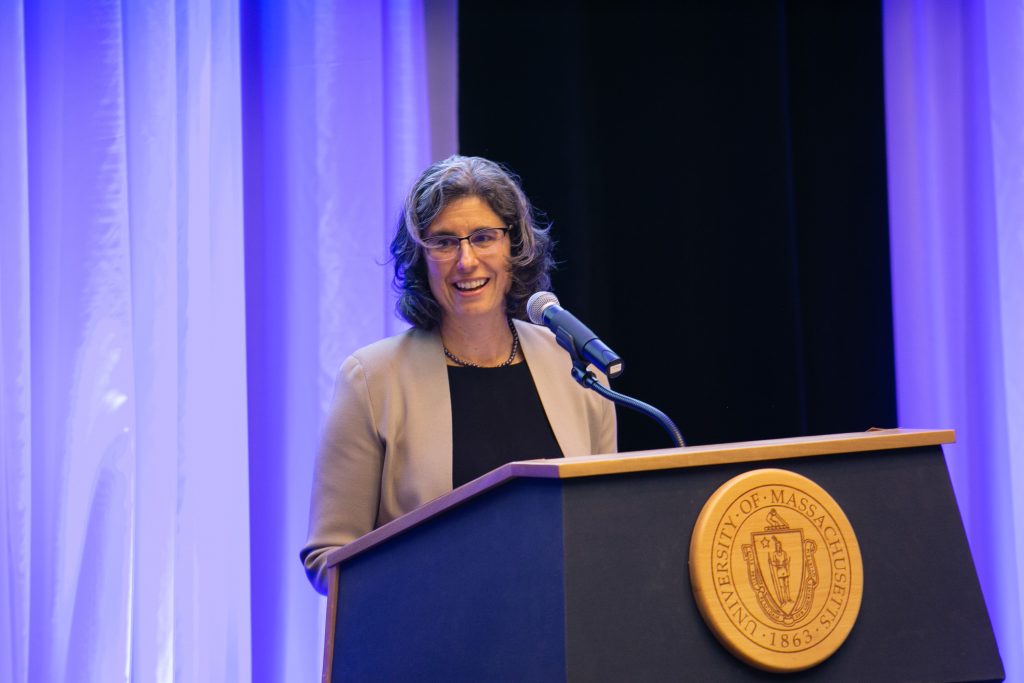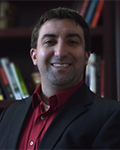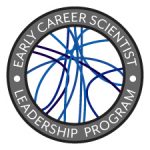
Mary Ellen Lane started down the traditional academic career path to faculty but changed directions to find her niche in academic administration—discovering a passion for leadership and enterprise thinking. After transitioning from an Assistant Professor position into administration, she’s served critical roles and moved through the ranks to become Dean at the Graduate School of Biomedical Sciences for the University of Massachusetts Medical School (UMMS).
In the Decoding Life series, we talk to geneticists with diverse career paths, tracing the many directions possible after research training. This series is brought to you by the GSA Early Career Scientist Career Development Subcommittee.
During her academic training, Mary Ellen Lane loved the culture of curiosity and discovery she found at universities. She received her PhD, completed two postdocs, and went on to become faculty at Rice University. It was there, through both her teaching and service on university committees for curriculum and student life, that she discovered a passion for driving the educational mission of the institution. After serving as an Assistant Dean and Associate Dean, she is now Dean of the Graduate School of Biomedical Sciences at UMass Medical School, where works to align the goals of the university with advancing graduate education.
What led you to your current position?
In many ways, it looked like the traditional academic career path but there’s a big kink in the road. After my undergraduate at Colgate University, I went straight to my PhD at Columbia University, then to a postdoc at Max Planck, a second postdoc at the Whitehead Institute, and onto the faculty job market. I lucked out and became an Assistant Professor at Rice University. I found funding, took on grad students, and had them graduate to find great jobs. For my service requirement, I chose the curriculum committee because it was university-wide, bringing me out of the bubble of my department to collaborate with scholars and educators from other disciplines. It also brought me out of my comfort zone of thinking only about how I taught my class and challenged me to think about the educational mission of the university on the enterprise level.
The next couple of years I continued to juggle both my faculty role and committee service. However, when I went up for tenure, I was given the message that I did not appropriately balance my research activity with my “outstanding teaching and exemplary service.” I thought about going somewhere else and trying the faculty thing again, but that wasn’t appealing. It’s one thing to keep your lab going, but I wasn’t interested in doing mini preps and buying a freezer all over again. At that time an Assistant Dean position in the MD Anderson Graduate School of Biomedical Scientists opened up. I put in an application, and as I was doing the research to write my cover letter, I realized, “I’m going to have an impact doing this.”
After overseeing graduate recruitment, I was looking for new opportunities, so I applied and became an Assistant Dean at UMass Medical School, where I oversaw academic affairs and was quickly promoted to Associate Dean. The Dean at the time was very supportive of my career, and when he stepped down, I was at the point in my career where I had outgrown my role as Associate Dean and was looking for a new challenge. The university ran a competitive search with internal and external applicants, and here I am as Dean. However, if you’d asked me when I was 22 if I wanted progressively increasing institutional responsibility in my life, I would have said no without hesitation. But I really do enjoy that with each step I feel like more of a participant in the strategic direction of the institution.
What does your typical day look like as a Dean?
A lot of strategic communication. I have a lot of meetings, and more often than not, I have a clear role in setting the agenda. I’m one of those people who enjoys meetings, so I feel it’s a good use of my time. I also do a lot of email communication—three defined times a day. I think hard about the words that go into the emails. The high points in my day are talking with students about where they are in their program and where they want to go, though I have fewer student meetings than I used to.
Also, since fundraising is part of the role of the Dean, I’ve been interacting with the advancement office in a way I didn’t before. That involves a lot more events than previously. As a very social person, I don’t mind!
How do you prioritize your schedule?
I go back to my own goals and values, the mandate for my job, and the mission for my school. Part of my goal is to have my institution know that I’m doing a good job and part of my value is to be thought of as competent. I ask what activities contribute most directly and importantly to those goals and values, and that’s what I prioritize. One of the things I’m learning to do is look at my calendar two weeks in advance to map my meetings. Then I look at where the meetings are not and put big blocks on my calendar. I make sure that I have two hours a day at a minimum where nothing can get scheduled. Those aren’t email times and they’re not urgent issue times. Then, I make sure every day there’s a combination of scheduled meetings, unscheduled times for email, and times when I can deal with anything else. The last critical part is 15 minutes at the end of the day in which I plan for tomorrow. When I’ve stuck to this structure, my energy is high during the day, and I leave with a sense of accomplishment.
What were the biggest challenges in moving between positions?
One of the biggest challenges in going from being a faculty member to 100% administration is dealing with the reflexive suspicion that many faculty have towards administrators. Having been a faculty member myself, I understand where this comes from and how pervasive it is. I’m very extroverted, so I can usually get over that, but when I moved here I was very much aware that there was going to be an incubation period to earn the trust of the faculty. Now that I’ve been here long enough, I have more of that trust, which is very helpful.
When I moved from Associate Dean to Dean, it was good that I understood the institutional culture. However, this is also one of the challenges of an internal move. I have relationships with people—students, faculty, and staff—based on one role, and now I have another. I’ve also learned if I move to a new institution, year one is for me to “shut-up and listen,” not to impose my beliefs on their institution. I need to figure out what’s important to them, what they want to see happen, and what they think the stress points are.
How did you negotiate through your career transitions?
The goal of any negotiation is not I-win, you-lose, but we both agree on this as an acceptable outcome. It’s also a conversation that you are best suited for when you go in with honest self-assessment and knowing what you bring to the table. Negotiating job offers is slightly different because the stakes are high. A mistake I made going into the faculty position was I didn’t know how to negotiate. When you go in thinking that it’s a choice between accepting what they give you and the abyss, you don’t have a lot of power.
However, when moving into a higher-level position, my advice is to hire a negotiation coach. I did that for this position and had never done it before. She put me through a three-day process of figuring out what I brought to the table, determining what outcomes I wanted, and then helping me strategize on structuring the conversation to get the outcome that I wanted. It’s not just about what’s in your paycheck; it’s about defining what you want to accomplish and asking for what you need to reach those goals. At the leadership level, part of my negotiation was getting resources for my team. I need to make sure that everybody is being recognized for the work that they’re doing.
About the author:
Tony Patelunas, University of Connecticut, is a liaison on the Early Career Scientist Career Development Subcommittee.
Learn more about GSA’s Early Career Scientist Leadership Program.































